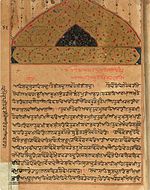- Mul Mantar
-
The Mul Mantar (Punjabi: ਮੂਲ ਮੰਤਰ, Mūla Maṃtar, pronounced Mool Mantar) is the first composition in the Sikh holy book, the Adi Granth. It is a series of affirmations and is the basis of Sikh theology.[1] The Mul Mantar is the first composition of Guru Nanak and the origin of the Adi Granth. The Adi Granth begins with the Mul Mantar and it occurs more than one hundred times throughout the text.[2] The Mul Mantar is the most widely known part of Sikh scripture but it has posed a challenge to translators.[3]
Contents
The text of the Mul Mantar
In Gurmukhi: ੴ ਸਤਿ ਨਾਮੁ ਕਰਤਾ ਪੁਰਖੁ ਨਿਰਭਉ ਨਿਰਵੈਰੁ ਅਕਾਲ ਮੂਰਤਿ ਅਜੂਨੀ ਸੈਭੰ ਗੁਰ ਪ੍ਰਸਾਦਿ ॥
॥ ਜਪੁ ॥
ਆਦਿ ਸਚੁ ਜੁਗਾਦਿ ਸਚੁ ॥ ਹੈ ਭੀ ਸਚੁ ਨਾਨਕ ਹੋਸੀ ਭੀ ਸਚੁ ॥੧॥
- Transliteration: ikk ōankār sat(i)-nām(u) kartā purakh(u) nirpà'u nirver(u) akāl mūrat(i) ajūnī sepàŋ gur-prasād(i) ॥
॥ jap(u) ॥
ād(i) sach(u) jugād(i) sach(u) ॥ he pì sach(u) ॥ nānak hōsī pì sach(u) ॥1॥
- English: One God, the true name, the creator, without fear, without hatred, timeless, self-existent, he blesses us with guru for true teachings.
- Some consider the Mul Mantar proper to end at "gur prasad"
- The small letters are not etymologically part of the word but are included in the Guru Granth Sahib for vocalization purposes.
Etymology
Mul means root, it has a similar etymological origin to the Punjabi language word Muli which means white radish.[4] A Mantar or Mantra is "an empowering formula for repetition". The Mul Mantar is thus the root statement of Sikhism.[5]
Translation
The Mul Mantar consists of nouns and adjectives but no verbs or pronouns. In addition, the nouns in the Mul Mantar do not have exact counterparts in European languages and the Gurmukhi script does not distinguish between upper and lower case letters. Thus, it poses a challenge to translators.
The first affirmation, for example, Ik Onkar has been rendered multiple ways. It has been translated as "'There is one god', as ‘One reality is’, and ‘This being is one’" and the varying capitalization of "God", "Reality", or "Being" affects the meaning in English.[6]
A number of translations erroneously change the Mul Mantar from a list of qualities to a statement of facts and Possessive adjectives.[7] For example, they may change Satnam from "truth by name" to "His name is truth", which adds a masculine quality to God which does not appear in the original Gurmukhi.[8]
References
- ^ Nesbitt, Eleanor M. (2005-11-15). Sikhism: a very short introduction. Oxford University Press. pp. 22–24. ISBN 9780192806017. http://books.google.com/books?id=8McnoJrNfB0C. Retrieved 17 July 2010.
- ^ Kalsi, Sewa Singh; Marty, Martin E. (2005-03). Sikhism. Chelsea House Publishers. p. 47. ISBN 9780791083567. http://books.google.com/books?id=INgxOAAACAAJ. Retrieved 17 July 2010.
- ^ Nesbitt, Eleanor M. (2005-11-15). Sikhism: a very short introduction. Oxford University Press. pp. 22–24. ISBN 9780192806017. http://books.google.com/books?id=8McnoJrNfB0C. Retrieved 17 July 2010.
- ^ Nesbitt, Eleanor M. (2005-11-15). Sikhism: a very short introduction. Oxford University Press. pp. 22–24. ISBN 9780192806017. http://books.google.com/books?id=8McnoJrNfB0C. Retrieved 17 July 2010.
- ^ Nesbitt, Eleanor M. (2005-11-15). Sikhism: a very short introduction. Oxford University Press. pp. 22–24. ISBN 9780192806017. http://books.google.com/books?id=8McnoJrNfB0C. Retrieved 17 July 2010.
- ^ Nesbitt, Eleanor M. (2005-11-15). Sikhism: a very short introduction. Oxford University Press. pp. 22–24. ISBN 9780192806017. http://books.google.com/books?id=8McnoJrNfB0C. Retrieved 17 July 2010.
- ^ Nesbitt, Eleanor M. (2005-11-15). Sikhism: a very short introduction. Oxford University Press. pp. 22–24. ISBN 9780192806017. http://books.google.com/books?id=8McnoJrNfB0C. Retrieved 17 July 2010.
- ^ Nesbitt, Eleanor M. (2005-11-15). Sikhism: a very short introduction. Oxford University Press. pp. 22–24. ISBN 9780192806017. http://books.google.com/books?id=8McnoJrNfB0C. Retrieved 17 July 2010.
Further reading
- Macauliffe, M.A (1909). The Sikh Religion: Its Gurus Sacred Writings and Authors. Low Price Publications. ISBN 81-7536-132-8.
- Shackle, C (1981). A Guru Nanak Glossary. School of Oriental and African Studies. ISBN 0728602431.
- Singh, Dalip (1999). Sikhism in the Words of the Guru. Lok Sahit Prakashan. ISBN B0000CPD3S.
- Singh, Dr. Gopal (1962). Guru-Granth Sahib Vol.1. Taplinger Publishing Co.. ISBN.
- Singh, Dr. Santokh (1990). English Transliteration and Interpretation of Nitnaym Baanees, Sikh Prayers for English Speaking Sikh Youth. Sikh Resource Centre. ISBN 1-895471-08-7.
- Osho (1994). The True Name, Vol.1 : Discourses on Japji Sahib of Guru Nanak Dev. New Age International(P) Ltd. ISBN 81-224-0606-8.
- Dr Sahib Singh, D Lit (Jan 1972). Shiri Guru Granth Sahib Darpan. Raj Publishers (Regd), Adda Husharpur Jallundhar.
External links
Mool Mantar | Japji | Jaap | Anand | Rehras | Benti Chaupai | Tav-Prasad Savaiye | Kirtan Sohila | Shabad Hazaray | Sukhmani | Asa di Var | Ardas |
Categories:- Sikh scripture
Wikimedia Foundation. 2010.


